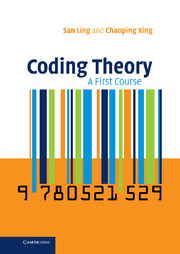Preface
Published online by Cambridge University Press: 06 July 2010
Summary
In the seminal paper ‘A mathematical theory of communication’ published in 1948, Claude Shannon showed that, given a noisy communication channel, there is a number, called the capacity of the channel, such that reliable communication can be achieved at any rate below the channel capacity, if proper encoding and decoding techniques are used. This marked the birth of coding theory, a field of study concerned with the transmission of data across noisy channels and the recovery of corrupted messages.
In barely more than half a century, coding, theory has seen phenomenal growth. It has found widespread application in areas ranging from communication systems, to compact disc players, to storage technology. In the effort to find good codes for practical purposes, researchers have moved beyond block codes to other paradigms, such as convolutional codes, turbo codes, space-time codes, low-density-parity-check (LDPC) codes and even quantum codes. While the problems in coding theory often arise from engineering applications, it is fascinating to note the crucial role played by mathematics in the development of the field. The importance of algebra, combinatorics and geometry in coding theory is a commonly acknowledged fact, with many deep mathematical results being used in elegant ways in the advancement of coding theory.
Coding theory therefore appeals not just to engineers and computer scientists, but also to mathematicians. It has become increasingly common to find the subject taught as part of undergraduate or graduate curricula in mathematics.
- Type
- Chapter
- Information
- Coding TheoryA First Course, pp. xi - xiiPublisher: Cambridge University PressPrint publication year: 2004



